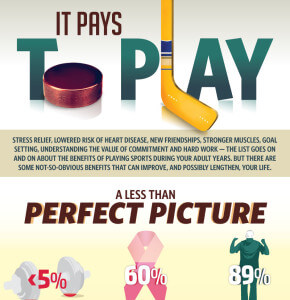A Less Than Perfect Picture
<5%
Adults who participate in 30 minutes of physical activity each day
60%
Reduced risk of breast cancer for women who exercise four or more hours per week
89%
Adult sport participants who report a life satisfaction of at least 7 on a 1-10 scale
Which Sport is for You?
In addition to the physical benefits exercise can provide, playing sports can help in myriad other ways.
Tennis
“Tennis is mostly mental. Of course, you must have a lot of physical skill, but you can’t play tennis well and not be a good thinker. You win or lose the match before you even go out there.”
Venus Williams, five-time Wimbledon singles champion
- Tennis players report higher scores in vigor, optimism and self-esteem and lower scores in depression, anger, confusion, anxiety and tension than other athletes and non-athletes.
- Potential new connections in the brain due to the sport’s alertness and tactical thinking and a continuing development of the brain.
45 beats per minute
Tennis legend Bjorn Borg’s resting heart rate
60-90 beats per minute
Healthy resting heart rate for most people
Golf
“Golf is the closest game to the game we call life. You get bad breaks from good shots; you get good breaks from bad shots, but you have to play the ball where it lies.”
Former golfer Bobby Jones
- Learning from adversity (such as poor shots), and having the patience and integrity to try and make the next shot better
- Acting with honesty and integrity when reporting a golf score
- Being present in the moment
9.6%
Of the U.S. population plays golf
Related resource: What Can I Do with a Golf Course Management Degree?
Baseball, basketball, football, soccer, hockey (team sports)
- Working as a team. Meshing the strengths of others with yours works well in many aspects of career and life.
- Working with new and unfamiliar people teaches you to deal with people you’ve never met before. Being comfortable in situations where you may not know anyone is a positive skill.
- Learning how to keep your cool when fans are yelling at you and trying to get under your skin is a good way to learn to block out and manage emotions and not let outside influences affect your performance and distract you from your goal. Learning to rise above is an important skill.
73%
Corporate executives who played sports
Swimming
- Learning to relax. You cannot float unless you relax
- Remembering to breathe. Important when doing laps and when anxious or stressed.
- Awareness of where you are. In swimming, it means you could bump into a wall or cross a lane. In life, it’s important to pay attention to what you’re doing now, as it can affect where you’ll end up.
65%
Americans who don’t know how to swim
Martial arts
- Self-defense techniques which work not only in class and competitions, but also in threatening situations.
- A greater sense of respect and responsibility.
- The ability to control fear and aggression, while relying on emotional stability and inner strength.
Over 4,000 years ago
When Chinese martial arts originated, during the Xia Dynasty
SOURCES:
http://www.usawaterpolo.org
http://www.hivehealthmedia.com
http://www.fitness.gov
http://www.womenssportsfoundation.org
http://experiencelife.com
http://uspta.com
http://www.forbes.com
http://www.adeptio.com
http://divinelyintuitivebusiness.com
http://youqueen.com
http://my.clevelandclinic.org
http://www.statisticbrain.com
http://www.prweb.com

